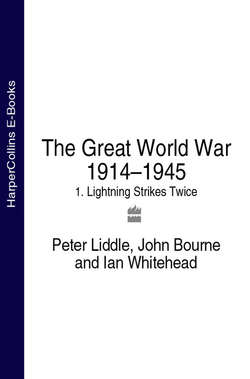Читать книгу The Great World War 1914–1945: 1. Lightning Strikes Twice - John Bourne - Страница 23
In conclusion
ОглавлениеThe view of war as an imposition from a world of affairs that was ‘nothing to do with us’ was not unique to merchant seafarers, and was probably universal. In his novel August, 1914, Alexander Solzhenitsyn describes what he plainly takes to be the common response to the onset of war: ‘People in the village did not discuss the war or even think about it as an event over which anyone had any control or which ought or ought not to be allowed to happen. They accepted the war… as the will of God, something like a blizzard or a dust-storm…’45 Pre-revolution rural Russia, at least in terms of outlook on the world and thinking about the possibilities of human control over events, was perhaps not so far distant from Britain, which was in 1914 probably the most industrialised nation on the planet. Very little of the apparatus of the modern democratic state then existed in the UK. Property and residential requirements left roughly half the adult male population without the right to vote, and of course virtually all women were unenfranchised. A sequence of electoral reforms ensured that by 1939 almost all of the adult population had the vote, but the knowledge and experience of the democratic process beyond electoral politics was inevitably rudimentary. A young infantry lieutenant, Neil McCallum, noted in his diary during the Second World War that he found it ironic that if he and his comrades were fighting for democracy, why was it so ‘hard to find an infantryman who could define democracy?’46
The merchant seafarer – or at least the ratings – came from the same stratum as McCallum’s infantrymen and were no less hard-pressed to explain what the war was about.47 Fifty years afterwards and thinking about how he and his shipmates had thought about the Second World War, Alan Peter, who had been a bosun, was surely right in his characterisation of attitudes:
‘We had no control over the politics of war, had we? In the fo’c’sles of all the ships that I can remember or amongst the crew when we’d sit out on the poop at night chewing the fat just before the sun went down, there’d be fooling about among the younger ones wrestling or sparring up to each other, doing their hobbies or playing the mouth organ. That was the usual thing and occurred no less than in peacetime. There was no great discussion about the pros and cons of war.’48
It is impossible to escape the conclusion that most merchant seamen, despite feeling the full brunt of war, especially in the Second World War, felt that it had little to do with them. They kept it out of their lives even though it pervaded them.
